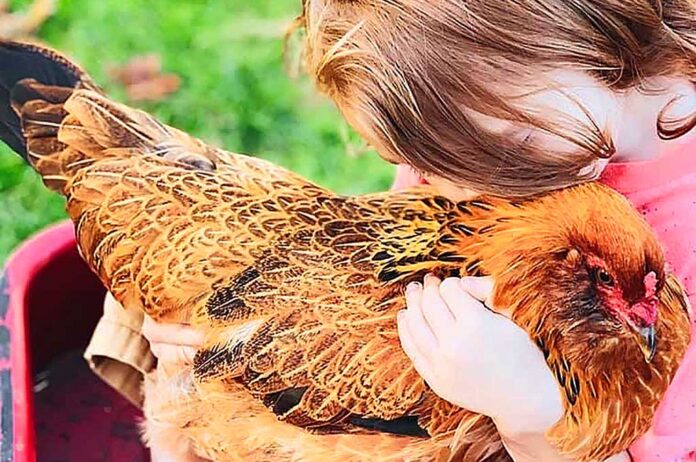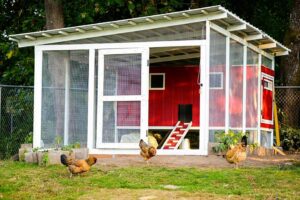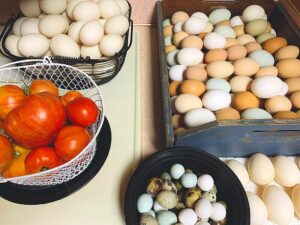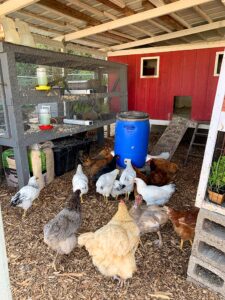
As Tigard officials consider directly addressing backyard chickens with city code, education, not additional regulation, is the most sustainable path forward, according to Elizabeth Sprague of Leron Heights.

“A lot of people jumped into owning chickens in the last couple of years. Adding classes on how to follow the (existing nuisance) codes, or to learn different ways predator and pest proofing would accomplish the same thing that they would achieve by adding restrictions,” she said.
Sprague and her family found their bustling little homestead in the crosshairs of the chicken code conversation this spring after a disgruntled neighbor repeatedly addressed the Tigard City Council with accusations that the Spragues’ animals were to blame for rodents in his yard.
Not so said several neighbors answered who Roger Potthoff’s missives about the property on Southwest Ann Street with a deluge of support for the Spragues and their small menagerie of animals.
“She, (her husband) Mike, and their boys make Leron Heights special. It’s the house on the corner with all the plants and animals. What a joy it is. What a delight they are,” neighbor Franki Baccellieri said in written comments to the City Council.
Baccellieri was one of about a dozen people who answered Potthoff’s complaints with stories about Elizabeth Sprague welcoming kids to hunt for eggs in her yard and passing out excess vegetables to neighbors during “kindness walks” with her boys.
The ongoing rodent problem, which Potthoff tied to the Spragues’ birds, is unrelated, they all said. Leron Heights would have rats with or without the chickens.
Elizabeth Sprague was disappointed to find her family at the center of a public conversation in which they had been accused but not included.
“I’m not a scary person. I’m really good at compromise,” she said. “If I can fix (a problem), I will.”
During a recent City Council meeting Sprague volunteered to participate in a proposed citizen group that would explore the possible addition of a new code to address urban livestock ownership.
She’s already created a PowerPoint presentation covering everything from the benefits of keeping birds to building a proper, pest-proof coop.
Tigard city code presently addresses urban livestock by proxy through nuisance laws. In other words, it’s not a problem unless it’s a problem.
This governance leaves space for a small, sustainable homestead to house enough birds to keep even a large family like the Spragues in eggs during the laying season.
Elizabeth, her husband, and their five boys live in a multi-generational household with Mike Sprague’s parents in his childhood home. The family has been on the same corner lot for nearly five decades.
Along with the humans, it’s home to two pygmy goats and about 30 chickens, ducks, and quail. The Sprague family has been cleared of their neighbor’s nuisance complaints, addressing small citations with tweaks that allow them to keep their animals.

The goats and many of the birds are rescues displaced by various natural disasters that the family adopted and hand raised. They made their way to the Spragues through wildfires and ice storms.
While the birds and goats are family pets they’re also an invaluable part of the backyard ecosystem.
“All the weeds go to the birds. They sit there and eat all the bugs and thatch up the grass,” she said. “The birds are a vital part in all of the gardening.”
For a family like the Spragues, who can easily eat two-dozen eggs a day, capping the number of chickens per household at three or five would destroy their potential to produce enough eggs to feed themselves.
“It’s really all about self-sustainability for us,” she said. “We’re a big family. I prefer to feed us with things we grow ourselves. We home school. It’s all a lesson. I want my kids to learn how to grow their own food and where an egg comes from.”
Under a previous city code that required chickens to be housed 100 feet from neighboring properties, the birds lacked the free-range mobility to wander in the garden eating weeds and bugs.
Present regulation, Sprague contends, is effective because it addresses problems that may arise from urban farming without impeding a family’s ability to self-sustain.
“When (the city) removed that 100-foot requirement it was because Tigard’s other codes already protected everybody,” Elizabeth Sprague said. “I think that’s still true.”






















